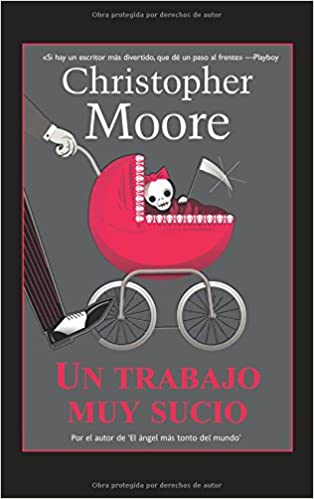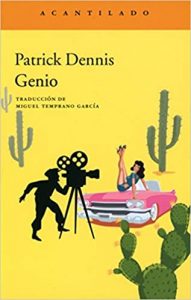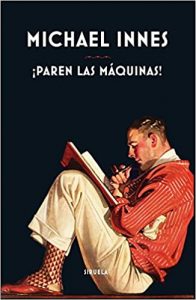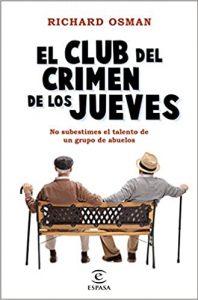If at the time we commented that the horror genre It deals with something as essentially human as fear, when addressing the issue of humorous literature we also connect with atavistic emotional essences.
Surely before the fire came it happened that one fine day a proto-man came out of his cave. As soon as he stepped into the forest, he tripped and fell to the ground. His grotto neighbor broke down in his own way, with a pseudo guttural laugh and his ostentatious blows to the chest of pure merriment, he had just invented humor. (Yes, of course that humor couldn't be smart stuff).
So little field is given to the humor genre itself as an entity of its own. Although the drops of humor habitually assault the novel, the essay or any other form of narration in verse or prose.
Even so, we always find the most purists, writers who make humor their argument via irony or grotesque, surrealism or ridicule. The point is to laugh. And when someone is able to laugh with a book in their hands, a special magic is produced.
Because the laymen to the matter of humor made book observe the scene in disbelief. In their brains they cannot imagine that a book can grant that moment of pleasure, that open and liberating laugh ...
The cultivators of humor are many. We are going to try to make a selection of essential works by authors with an unusual comedy embodied in black on white ...
Top 8 recommended humor books
Wilt by Tom Sharpe
Wilt is a guy from that other side of the mirror of our reality, a character who should occupy a preferential seat in the stalls where the imagination of so many writers arranges their creations so that they end up contemplating the world. And Don Quixote, Ignatius Really, Gregorio Samsa or Max Estrella do not laugh while they observe the ridiculousness of reality, that construction of subjective wills, impulses and contradictions buried as victims of a separate novel.
Anyway, ramblings aside, in this novel we meet the eccentric Wilt at that precise moment in which he finally gives free rein to all his eccentricities, that moment of liberation in which Wilt discovers that the farce is not worth pursuing. Decorating the plot with an inflatable doll, which, if I remember correctly, appears buried in the same school where Wilt works, or with some policemen dazzled by the happiness of a man on the brink of catastrophe, invites us to laugh about that grotesque of the former she spoke.
A grotesque spread to the educational system with the excuse of a professor Wilt in full effervescence. In general, it is a scenario about the ridiculous that can be projected into any environment, although focused in this case on the classist England. A novel about the variability of the principles to which Groucho Marx pointed out, and whoever does not like those principles, you can always resort to to others…
The Conspiracy of Fools, by John Kennedy Toole
Sometimes humor is the acid reflection of a clairvoyant vision of a world infested with mediocrity, cynicism and abject contradictions. Kennedy Toole portrayed in this book the antihero that we all are, the ridiculous supine, the hyperbole of our human nature, the grotesque human being in society and its evolution towards catastrophe from the denial of miseries.
Laughing at Ignatius is at least healthy in that part of the mockery of ourselves. In the best of cases, before an optimistic reader, the laughter at the ridiculous protagonist also ends up. The question is to laugh even though there is finally that strange residue on the infamous guy who looks nothing like us ...
Ignatius J. Reilly He is a universal character, in literature and in his sad reflection of real life. The moment comes when every enlightened man discovers that the world is full of fools. In that harsh moment of astonishing certainty, the best thing to do is to withdraw into yourself and enjoy some good sausages.
A Very Dirty Job, by Christopher Moore
What to laugh at after all? of death, of course. There is no choice but to look into that unfathomable abyss behind the “the end” sign and have a laugh with the bloody dust that we will be and that will get into the eyes of the unwary on windy days.
That's what Moore must have thought when he created poor little Charlie Asher and endowed him with the ability to accompany death wherever he goes, making it easier for the grim reaper to reap lives in a harvest never so frenzied thanks to Asher.
It must be that death is a big fan of Murphy. And you know, when things go too well, wait for the storm of chicha calm.
In his nondescript presence, Asher is one of the three luckiest guys in the world (the other two have already been killed in scooter accidents). Together with his wife he composes that symphony of normality until Sophie is conceived. Because it is her arrival and death appears (perhaps due to lack of sleep or simple fortune). Asher's hilarious future is accompanied by people who die as soon as they are near him and prophetic messages that announce more and more deaths. Fed up with crazy death, disgusting argument for that strange sigh that finally accompanies the cessation of laughter.
Genius, by Patrick Dennis
I love novels that satirize those worlds presented with their perfection of smiles and good vibes. And although in the end there is always a bitter residue in all satirical mockery, that is precisely the transcendent humor.
A novel that takes us into the back room of glamorous Hollywood. A fiction about the fictional lives that parade down the red carpet. A close look at the wispy stars where everyone wanted to be reflected.
In this book Genius, the writer Patrick Dennis, closely linked to the cinema of the 50s and 60s, dismantles the farandulian myth and presents the lives of actors, directors, producers, screenwriters and other pleiades, turning them into a bunch of beings clinging to the fleeting brightness of the premieres and glory.
To laugh at everything, nothing better than starting with yourself. Patrick Dennis himself is represented in his novel with his own name and his role as a writer condemned to a creative jam. The great director Leander Starr, fled to Mexican lands to escape women and tax inspectors, recruits him to write the script for his brilliant new film.
As if it were Don Quixote and Sancho Panza, both characters move in a satire on the world of cinema. With its eccentricities and its weaknesses, with its vices and its megalomanias. The mythical world of the most splendid of the known Hollywoods makes landfall in this novel. But in a way it is for the better. Mythologizing is easy enough. Knowing the realities behind emblematic characters who occupy positions of honor in the popular imagination, lowers the matter a bit with soda.
Although in the end, getting to know miseries and baseness, laughing with the noise and madness of those actors during those years, ends up increasing the myth. It is something without a doubt curious, which has more to do with nostalgia for the past than with the harsh reality of the daily lives of the stars on the red carpet.
The Sold Out, by Paul Beatty
Laughing at the tragic, in a credible, convincing and magnetic way is an act of literary sublimation. The protagonist of this story is a guy who, devoid of what little he had left in the world, decides to launch a continuous laugh at a world that has lost all meaning.
Shrouded in the smoke of marijuana, the protagonist of the story, recently orphaned and with no known name, considers existence as a series of pending issues that only he can take care of. Having reached the state of things to such an extreme of extreme bullshit, only his iron will can once again build a world of dignity.
Satire is the final trick with which Paul Beatty gives this story a painful laugh that flies over such sordid issues as racism taken to the extreme of slavery. But you always smile, whatever happens, Beatty knows how to get a laugh out of you.
The literary composition of a delusion of this magnitude can only be read and understood by fools who go through the same delusional period of history. Hence this novel is a masterpiece of modernity, decadence and the overcoming of everything through a pathological laugh. I'm not telling you anymore… Well yes, he was awarded the 2016 Booker Prize, no less.
Stop the Machines! By Michael Innes
A writer who writes about another writer. Knowledgeable literature. An easy documentation task for good old Michael Innes, who left us in 1994.
Jokes aside, what the book Stop the machines! presents us is an interesting combination of humor and thriller. Difficult combination, don't you think? The black, acid humor is what it has, it goes well with everything.
A writer named Richard Eliot lives comfortably thanks to his detective novels in which a character named Spider, a sophisticated criminal where they exist, emerges unscathed from a thousand ambushes that the forces of order prepare to catch him. Only when the Spider manages to redirect its conduct does it agree with the police its integration into society, with the agreed compensation.
But, at a given moment, that fiction jumps to the closest reality of the author Richard Eliot to upset everything. With the very modus operandi of the Spider, which makes everyone doubt about the imitation or directly the possible jump from fiction, the character goes to reality to portray in each of his acts a decadent society focused on appearances. The Spider is a criminal after whose trail he brings out the worst of those supposedly higher layers.
Scenarios in a certain way surreal are happening around this singular case of replication of a fictional character. Every moment the most bizarre characters appear that awaken comedy and complicity in a reader who is delighted to move between mystery and intrigue with that latent sensation of tragic humor. A literary work that has become a constant mockery of the supposed morality in which the vilest souls, the great men and women who walk the world, hide their superiority.
Richard Osman's Thursday Crime Club
It is not always easy to read a humorous novel. Because people assume that a guy who reads a book is delving into brainy essays or gripped by the tension of the novel plot of the day.
So laughing while reading quickly invites you to think about some kind of psychopathy. I spent a lot with Tom sharpe, genius of crazy plots who in a great way evokes this Richard Osman novel.
Because again it is about ridiculing completely opposite genres such as police. And in that, in the grotesque made satire, these two English pens know well how to awaken the most liberating hilarity. Because in the most ridiculous scenes, literature can measure up to any other form of humor.
In a peaceful private retirement complex, four unlikely friends meet once a week to review old unsolved local murder cases.
They are Ron, an ex-socialist activist full of tattoos and revolution; sweet Joyce, a widow who is not as naive as she appears; Ibrahim, a former psychiatrist with incredible analytical skills, and the tremendous and enigmatic Elizabeth, who, at 81, leads the group of amateur researchers ... or not so much.
When a local real estate developer is found dead with a mysterious photograph next to the body, The Thursday Crime Club is in the middle of its first real case. Although they are octogenarians, the four friends have a few tricks up their sleeve.
50 Shades of Luisi, by Ángel Sanchidrián
The lust of every woman was awakened by that erotic novel that broke out a few years ago. I mean 50 shades of Gray. Groups of friends could be heard blushing and laughing as they shared scenes from the book or the movie that followed.
Undoubtedly, the erotic narrative found an unusual space on the shelves of all the libraries and bookstores in the country, the sexual debauchery had reached the letters, so that the reading brains, mostly female, reached the ecstasy of the imagination.
Luisi surely discovered the panther that lived there. With the humor typical of the cliché, which disfigures the staff to transform it into the most comically stale of manners, we find the housewife woman who begins to feel runaway hormones, over which she feels she can let herself go, like a Doña Quixota of eroticism . The good man of Manolo will be his toy and his fetish, his graceful lover or the patient of his grotesque fantasies ...
The result is hilarious and brilliant in its composition full of contrasts on that stale labeling that still survives in some spaces. A novel only at the height of a type as imaginative and satirical as Ángel Sanchidrián, of whom I have already reviewed his previous work. Three-odd dwarfs.
The most curious thing of all is that this launch in satirical tone will coincide with the publication of a new installment of 50 shades of Gray: Darker. Let's see who can escape the confrontation of the two novels ...
Summary: Luisi is that housewife we all know. Neither fat nor skinny, neither old nor young, the typical mother, friend or neighbor that we all have and who is not ashamed to cover her head with a Carrefour bag when it rains. Nor to follow the guidelines of the 50 shades of gray if that can spice up your sex life. This traditional heroine began her adventures with "50 Shades of Luisi", the story by Ángel Sanchidrián that became a trending topic on Twitter with more than three and a half million reactions.









4 comments on «Pártete la caja. The best humor books »